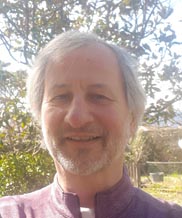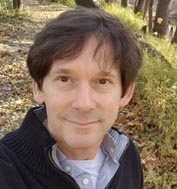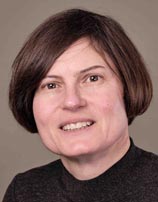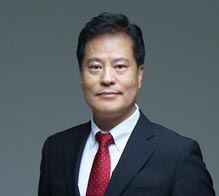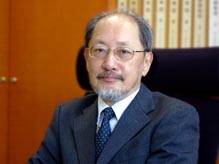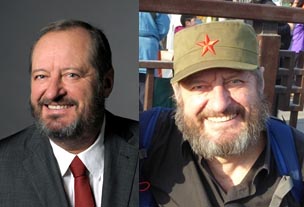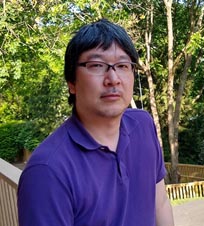 |
ISCApad #306 |
| Saturday, December 09, 2023 by Chris Wellekens |
2 ISCA News
| 2-1 | Message of Dr Odette Scharenborg, ISCA president
Dear ISCA members
For many of us who follow the Gregorian calendar, December is the last month of the year. The month in which many of us are trying to finish the last bits and pieces before going on a well-deserved holiday to end 2023 and start the New Year, hopefully well-rested, on January 1. However, for many others amongst us, the New Year has already begun, for them: I hope you had a great start to the New Year!
The new year will bring us Interspeech. As announced in my previous message, Interspeech 2024 will be held in Greece. The Interspeech 2024 organisers visited several potential sites for Interspeech 2024 in Greece, after which they decided that their preferred site is Kos, but please note that negotiations are still ongoing. In the meantime I hope that many of you have started preparing their papers in time for submission before the March 2nd, 2024 deadline!
Nominations for ISCA Distinguished Lecturer In the previous ISCAPad I already announced nomination season and mentioned the deadlines for the ISCA Medal for Scientific Achievement (January 5, 2024) and the ISCA Fellows Program (February 10, 2024). Additionally, nominations are also sought for the ISCA Distinguished Lecturers, the deadline is January 31, 2024. So…. Look around you and nominate those amazing colleagues! More information on the procedure and the nomination forms can be found at our website: https://www.isca-speech.org/iscaweb/.
Upcoming deadlines:
Important dates:
Happy holidays and I am looking forward to seeing you in 2024!
Odette Scharenborg ISCA President
| |||||
| 2-2 | 2023 ISCA FELLOWS 2023 ISCA FELLOWS Announced:
Is it is common practice since several years, the ISCA Fellows Selection Committee has worked over the last months to seek out nominations and endorsements for this year’s ISCA Fellows selection. The ISCA Fellows Selection Committee maintains a rigorous process of collecting and evaluating all nominations (more details are found on the ISCA webpage at: https://www.isca-speech.org/iscaweb/index.php/honors/fellows). After extensive evaluations and reviews, the following eight distinguished researchers will be elevated to the status of ISCA Fellow for 2023. Their citations as well as affiliations are highlighted below. Please join us in congratulating these well deserving colleagues for their research contributions to the field of speech communication and technology! All will be recognized at INTERSPEECH 2023 in Dublin, Ireland, in August.
Phil Green (ISCA Fellows Board Member) Sebastian Möller (ISCA President)
| |||||
| 2-3 | ELRA/ISCA Special Interest Group: Under-resourced Languages (SIGUL) ELRA/ISCA Special Interest Group: Under-resourced Languages (SIGUL) Created in April 2017, SIGUL is a joint Special Interest Group of the European Language Resources Association (ELRA) and of the International Speech Communication Association (ISCA). This year, SIGUL enters the fifth year and now has more than 300 members. The SIGUL Board is elected every two years, and last year SIGUL had a new Board officer: Chair and ISCA liaison representative: Sakriani Sakti (JAIST, Japan) Co-chair and ELRA liaison representative: Claudia Soria (CNR-ILC, Italy) Secretary: Maite Melero (Barcelona Supercomputing Center, Spain)
SIGUL has organized various events, including the Spoken Language Technologies for Under-resourced languages (SLTU) Workshop Series, which has been organized since 2008, and Collaboration and Computing for Under-Resourced Languages (CCURL), which has been organized as LREC Workshop since 2014. From this year, the tradition of CCURL-SLTU will be united into one SIGUL Workshop and planned to be held as a Satellite Workshop of LREC or INTERSPEECH. The 1st Annual Meeting of the ELRA/ISCA Special Interest Group on Under-Resourced Languages (SIGUL 2022) will be held as Satellite Workshop of LREC 2022, Marseille (FR), 24-25 June 2022. The SIGUL venue will provide a forum for the presentation of cutting-edge research in NLP/SLP for under-resourced languages to both academic and industry researchers, and also offer a venue where researchers in different disciplines and from varied backgrounds can fruitfully explore new areas of intellectual and practical development while honoring their common interest of sustaining less-resourced languages. Topics include but are not limited to:
We also invite position papers on methodological, ethical, or institutional issues. Important Dates:
More details can be found on the workshop web page: https://sigul-2022.ilc.cnr.it/
SIGUL Board Sakriani Sakti Claudia Soria Maite Melero
| |||||
| 2-4 | ISCA Language SIGS ISCA supports speech communication research activities in various languages. The individual languages have equal interest, but they may involve have different technical or scientific problems. For example, some languages are tonal, while others are not; Some languages have only one writing system, while others have several. In the ISCA community, we have 6 language Special Interest Groups (SIGs) for Chinese, French, Italian, Iberian, Indian, and Russian. Each SIG is organised by researchers who speak the language of interest as L1 and others who have a technical or scientific interest in the language. Each SIG sponsors domestic and international research activities, and representative members of the SIGs attend a Lang SIG meeting every year during the INTERSPEECH conference. In this meeting, recent activities of each SIG are reported, and new ideas are exchanged. We also review what ISCA can do for the SIGs and what the SIGs can do for ISCA. Each SIG has its own web page, and you can visit the pages here. Prof. Nobuaki MINEMATSU The University of Tokyo Japan
| |||||
| 2-5 | ISCA Special Interest Group (SIG) 'Spoken Language Translation'
ISCA SIG “Spoken Language Translation” Aims. The SIG SLT covers all aspects of spoken language translation — simultaneous translation and interpretation, speech dubbing, speech-to-text translation, speech-to-speech translation, cross-lingual communication including paralinguistic, emotional or multimodal information, and related areas SIG SLT will (a) provide members of ISCA with a special interest in spoken language translation and its related areas with a means of exchanging news of recent research developments and other matters of interest in spoken language translation; (b) organize challenges and evaluation campaigns; (c) sponsor and organize the International Conference on Spoken Language Translation (IWSLT), meetings, satellites, and tutorial workshops in spoken language translation, operating within the framework of ISCA's by-laws for SIGs; and (d) make available open-source code and data resources, best practices and tools, and evaluation metrics relevant to spoken language translation.
Motivation. Recent interest in speech translation and simultaneous translation by machine has been growing explosively, due to continued performance advances and a growing international need for simultaneous translation and interpretation, speech dubbing, speech-to-text translation, speech-to-speech translation, cross-lingual communication including paralinguistic, emotional or multimodal information, and related areas. The under-covered elements in the current research are, for instance, incremental simultaneous speech-to-speech translation, paralinguistic translation, speaking style translation across languages. The proposed SIG will be organized by the members who are interested in spoken language translation/interpretation from various related areas such as ASR, TTS, and MT. SIG SLT emerged from over two decades of organizing the International Conference on Spoken Language Translation (IWSLT) and its predecessor C-Star, scaling operations in response to significant growth in the field. The organizers of IWSLT and partners believe it is now time to join with ISCA by creating an ISCA SIG. IWSLT has a 15-year track record of profitability; it runs the premier benchmarking campaign on spoken language translation annually accompanied by an international scientific conference to present and discuss results.
| |||||
| 2-6 | ISCA-PEDRAC: a new service of ISCA. ISCA-PECRAC (Postdoc & Early Career Researcher Advisory Committee) Annual Gathering aims to provide an opportunity for postdoc & early career researchers to meet and communicate at INTERSPEECH. In the framework of ISCA-PECRAC, we would like:
Contacts: Yaru Wu (yaru.wu@sorbonne-nouvelle.fr) Berrak Sisman (berrak_sisman@sutd.edu.sg)
| |||||
| 2-7 | ISCA social networks We encourage all members tokeep contact with ISCA via our social nets. Also you will bde kept informed about all events on our website. This is particularly important in this time where due to the coronavirus, many modifications may be brought to the conference.
ISCA Facebook : https://www.facebook.com/iscaspeech/ ISCA Twitter : https://twitter.com/ISCAFOX ISCA SAC Student Facebook : https://www.facebook.com/groups/98794207409/ website : www.isca-speech.org
| |||||
| 2-8 | Women in Speech Research ISCA is committed to supporting diversity in speech communication, and celebrating speech
| |||||
| 2-9 | ISCA Distinguished Lecturer for 2023-2024 We are pleased to announce the Distinguished Lecturer for 2023-2024:
| |||||
| 2-10 | Bids for Interspeech 2027 Dear ISCA Members, Bids for Interspeech 2027 ISCA now invites bids for hosting Interspeech 2027. Interspeech conferences include papers on all the scientific and technological aspects of Speech. More than 1,500 participants from all over the world attend the conference annually to present their work in oral and poster sessions. Several satellite workshops and a Scientific and Industrial Exhibition highly enrich the conference content. Interspeech conferences may be held in any country, although they generally should not occur on the same continent in two consecutive years. After this year's Interspeech conference in Dublin, the next conferences will be held in Greece (replacing Jerusalem ,Israel) in 2024, Rotterdam (The Netherlands) in 2025, and Sydney (Australia) in 2026. In order to prepare the bid, please contact the ISCA conference coordinators at conferences@isca-speech.org well in advance of the deadline in order to prepare a high-quality bid. Each bid needs to include:
Guidelines on how to prepare an Interspeech conference can be found here. Deadline for bid submission: extended to january 1st, 2024
| |||||
| 2-11 | ISCA Medals and Fellows Nominations 2024ISCA Medals and Fellows Nominations 2024Nominations are open for the following ISCA Awards: The ISCA Medal for Scientific Achievement recognizes and honors an individual each year who has made extraordinary contributions to the field of speech communication science and technology. Any ISCA member can make a nomination. All nominations for ISCA Medal for Scientific Achievement should be submitted to the ISCA Secretary at secretariat@isca-speech.org by 5 January 2024 using the nomination form. The ISCA Board will select the winner by 1 February and announce the winner in the March 2024 ISCApad. Unsuccessful candidates from previous year(s) must be re-nominated to qualify for candidacy. The ISCA Service Medal recognizes an ISCA member who has provided extraordinary service to ISCA and/or the Speech Communication community. Any ISCA Board or Advisory Council member can make a nomination. All nominations for an ISCA Service Medal should be submitted to the ISCA Secretary at secretariat@isca-speech.org by 5 January 2024 using the nomination form. Unsuccessful candidates from previous year(s) must be re-nominated to qualify for candidacy. The ISCA Fellows Program recognises and honours outstanding members who have made significant contributions to the science and technology of speech communication. To qualify for this distinction, a candidate must have been an ISCA member for five years or more with a minimum of ten years experience in the field. Nominations may be made by any ISCA member except for those on the Felows Selection Committee.. Fellows may be recognised by their outstanding scientific and/or technical contributions and/or continued significant service to ISCA. The supporting case for the candidate's nomination should include up to 3 major contributions which have had impact on the speech community and/or society in general. A nomination should be supported by 3 references from senior scientists/technologists in the Speech Communication community, for instance ISCA Fellows and ISCA Board members. Current ISCA Board members are not eligible for nomination. Members of the Fellows Selection Committee may not nominate candidates or provide references. All nominations for ISCA Fellow should be sent to fellows_nomination AT isca-speech.org by 10 February 2024 using the nomination form. Those who plan to nominate are strongly advised to send brief information on candidates (candidate's name and affiliation) to the above email address before January 10 with your name and contact email address. More information can be found on the ISCA Honors webpage.
| |||||
| 2-12 | Prix de thèse AFCP Appel à candidatures APPEL A CANDIDATURES
Prix de thèse AFCP 2023
Depuis 2004, l'Association Francophone de la Communication Parlée (AFCP) décerne un prix scientifique récompensant la grande qualité d'un travail de thèse francophone du domaine (ou anglophone issue d'un laboratoire francophone), afin de promouvoir les recherches en communication parlée, fondamentales ou appliquées, dans le domaine des technologies de la communication, des sciences humaines et de la vie. Ce prix permet de soutenir et diffuser les travaux de jeunes chercheurs du domaine.
Le prix est décerné par un jury composé des chercheurs élus du conseil d'administration de l'AFCP. Il sera officiellement remis lors des prochaines Journées d'Etudes sur la Parole.
Le ou la lauréat(e) se verra remettre la somme de 500 euros et sera invité(e) à présenter ses travaux à la communauté de la communication parlée lors des prochaines JEP (inscription offerte à la conférence). Il/elle se verra également offrir l'opportunité de publier sa thèse sous la forme d'un livre dans la collection « Parole » (éditions CIPA).
CALENDRIER
Date limite de dépôt du dossier : 31 janvier 2024
Décision du jury AFCP : avril-mai 2024
Remise officielle du prix : JEP 2024
CONDITIONS DE CANDIDATURE A CET APPEL
Peut postuler au présent appel : tout docteur dont la thèse, préparée dans un laboratoire francophone, et rédigée en français ou en anglais, a été soutenue entre le 1er janvier et le 31 décembre 2023. Toute candidature est limitée à une seule édition du prix. Seuls les dossiers complets de candidature seront examinés.
CANDIDATURE
Pour postuler, il suffit de :
(1) Envoyer un e-mail déclarant votre intention de postuler, avec vos nom, prénom, titre de la thèse, directeur de thèse, et date de la soutenance à: camille.guinaudeau@limsi.fr. Vous recevrez un accusé de réception.
(2) Déposer votre manuscrit de thèse en PDF sur le serveur du site web de l'AFCP : http://www.afcp-parole.org/soumettre-une-these/
(3) Envoyer votre dossier complet via un courrier électronique à l'adresse camille.guinaudeau@limsi.fr. La pièce jointe sera constituée d'un fichier unique (nommé VOTRENOM.pdf), contenant dans l'ordre : (i) le résumé de la thèse (2 pages) accompagné d'une liste de mots clés ; (ii) la liste des publications ; (iii) les rapports des rapporteurs autorisant la soutenance et le rapport de soutenance de thèse ; (iv) une lettre de recommandation du directeur de thèse ; (v) un CV (avec coordonnées complètes dont e-mail).
_____________Date de dépôt du dossier : 31 janvier 2024____________
| |||||
| 2-13 | Nominations Open for ISCA Distinguished Lecturers 2024Nominations Open for ISCA Distinguished Lecturers 2024We are now open for nominations for ISCA’s Distinguished Lecturers scheme for the period 2024-25.This outreach scheme supports leading researchers in Speech Communication to deliver lecture tours in regions where our field is under-represented.Distinguished Lecturers normally serve for 2 years, during which time they typically undertake 3 lecture tours.Details of the DL scheme, including the nomination form, are available on the ISCA Web Site here.Each nomination should include the following information:
Please note that the nominator must ensure the candidate is willing to serve if elected. Nominations from previous years will be only considered if they have been updated. Self-nominations are permitted, but must include a letter of support from an ISCA Fellow or Board Member.Nominations should be sent to dl_nominations@isca-speech.org before 31 January 2024
|


